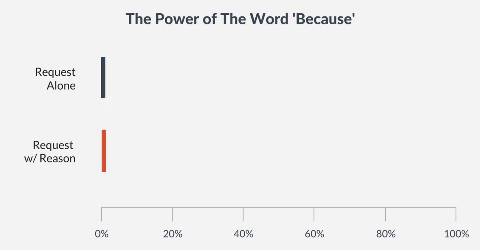See why you should follow your asks with ‘because…’ on your next sales call.
While reading the book Influence by Dr. Robert Cialdini, I came across some incredible research on the power of the word “because”.
A well-known principle of human behavior states that if you’re asking for a favor, you’ll be more successful if you provide a reason. Why? It’s simple, people like to have a reason behind the things they do.
The Copy Machine Study
Social psychologist Ellen Langer demonstrated this unsurprising fact with a simple experiment. She asked a small favor of people waiting in line to use a library photocopier: Excuse me, I have five pages. May I use the Xerox machine because I’m in a rush?
The request-plus-reason resulted in near-total effectiveness. 94% of people Dr. Langer asked let her skip ahead of them in line.
Compare this to the success rate of the request alone: Excuse me, I have five pages. May I use the Xerox machine? Only 60% of those asked let her cut in line in this instance.
Your first conclusion may be that the critical difference between the two requests was the extra information: “because I’m in a rush.” However, Dr. Langer tested a third type of request that showed this was not the case. It was not the reason as a whole, but the word ‘because’ that made the difference.
Dr. Langer’s third type of request did not include a real reason for compliance. She used the word ‘because’ but then added nothing new and instead, restated the obvious: Excuse me, I have five pages. May I use the Xerox machine because I have to make some copies?
Once again, nearly everyone agreed (93%). No real reason or new information was added to justify their compliance.

Replicating the Experiment in Sales
Our sales team gathers a large amount of information from various places in an organization. We speak to switchboard operators, administrative assistants, IT help desks, etc. to get:
- Executive names and titles
- Reporting structures
- Direct lines
- Cell Phone numbers
- Systems currently in place
- Current vendors
- Business plans
This information and anything else relevant is part of their 3×3 research. The idea is that by gathering more information you can form stronger Hypothesis of Need–why a prospect might need your offering. A well-formed hypothesis allows you to call with a purpose tailored to that person instead of cold calling with a canned message.
It can be eye-opening to see what information you can get from gatekeepers and admins during a cold call by asking the right questions. In our sales training days, we would demonstrate this phenomenon by doing live cold calls on speakerphone.
So, how are my questions so different from yours?
Because of two simple truths: 1) We ask and 2) We give a reason using the word “because.”
We always knew that giving a reason was the key to getting people talking, but Dr. Langer’s experiment is empirical proof. When asking for anything, always follow it with the word “because.”
When you ask for the:
- Name the prospect goes by
- Title and responsibilities
- Reporting structure
- Direct line and/or cell phone number
- Current systems, processes, vendors
- Future business plans
- Other 3×3 Research
From any of these people:
- Switchboard operator (headquarters or different locations)
- Administrative assistants (to your prospects or other executives)
- IT help desk
- Junior employees in the department
- Sales or customer service lines
Tell them you need it:
BECAUSE you share a LinkedIn group with the executive
BECAUSE you don’t want to embarrass yourself when you talk to the executive
BECAUSE you are inviting the executive to an exclusive event
BECAUSE you have confidential executive information for them
BECAUSE you need to ensure that you don’t waste their time with something they don’t need
BECAUSE your boss asked you to get this information and will kill you if you don’t
BECAUSE you had a conversation with one of their colleagues who sent you to them
BECAUSE your dog ate their business card
BECAUSE if they give you the information it will really make your day
BECAUSE ‘tis better to give than to receive
BECAUSE if they give it to you the Dali Lama will grant them enlightenment
The best part is that the reason doesn’t even matter. The only thing that matters is that you have a reason, no matter how weak or lame that reason might be. Just be sure to use the word ‘because.’ Circular logic is your new best friend: “I need his direct line because I need to reach him.”
Following the law of reciprocity (also covered in Influence), I have a favor to ask. Now that I have unlocked the magic of the word ‘because’ for you, go out and try it.
Try anything new at least a hundred times before casting judgment. Why? Because 1) you need a large enough sample size before you know if it works and 2) you need to practice something new to get smooth with it. (See how I gave you two ‘because’ statements there?)
Once you’ve tried it a hundred times, write a comment below on how it’s working for you. What information were you able to acquire by using ‘because’ that you wouldn’t have before? How has this information helped you sell to them and generate revenue?
Join the Conversation Revolution
Sign up to join the conversation revolution.
Thanks for joining our mailing list. Look for your first newsletter next Monday!

